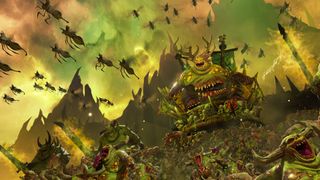The impact of Denuvo on Total War: Warhammer 3 is still being investigated
Creative Assembly has been testing it and the results so far are inconclusive.

Denuvo has become a recurring PC gaming villain, frequently blamed for launch issues and problems with performance. Even when it's working as intended DRM is never good for players, but time and time again Denuvo has been accused of making otherwise good games quite awful to play. This is currently the case with Total War: Warhammer 3, and Creative Assembly has been investigating its impact.
While it's an impressive strategy romp—just take a look at our Total War: Warhammer 3 review—the launch was marred by technical issues, and while they can't all be blamed on Denuvo, when it comes to the performance niggles it's been held up as responsible.
Creative Assembly does appear to be taking this seriously, but in a broad post on the work it's doing on stability, bugs and other issues it notes a few misconceptions about the DRM.
The build reviewers played was stable. I didn't encounter any problems, and while the frame rate was a bit lower than I would have liked, nothing stood out as troublesome. It wasn't until launch that the issues started. The assumption has been that Creative Assembly didn't introduce Denuvo until the launch build, but apparently that wasn't the case.
"Denuvo was included in press and content creator review builds," the post explains. "Why their performance was impacted post-launch is something we are actively working to understand, but the program was not purposefully omitted and then later added for the sake of the reviews."

Creative Assembly also clarified that Denuvo has been in previous Total War games, so this is not a case of something new being added that's screwed everything up. This could mean that there's another factor that's causing problems with Denuvo.
And while the DRM is being treated as a potential source of Warhammer 3's recent woes, Creative Assembly adds that the evidence is not yet conclusive. "Many players have presented evidence both ways, and there are likely to be many factors that weigh into the conversation. When we are confident in our results, we will make a call at that time."
The biggest gaming news, reviews and hardware deals
Keep up to date with the most important stories and the best deals, as picked by the PC Gamer team.
The transparency and ongoing investigation are both welcome, though Creative Assembly is also attempting to steer the conversation, threatening to treat any "off-topic comments about the technology as spam", which includes "calling for its removal". Given its atrocious reputation and the fact that it does nothing good for players, it seems pretty reasonable to want it out. It's an ill-conceived attempt to curtail the over-egged threat of piracy, and there's no reason why players should want it in their games.
Elsewhere in the post, Creative Assembly offered a timeline for the next patch. It'll be targeting issues like ALT+TAB stability, unintended v-sync lock, battle desyncs, installation problems, as well as making Alderlake improvements that will hopefully stop the stuttering affecting players using 12th gen Intel processors. The team is aiming to release the patch on March 10, though it could be postponed to March 17.

Fraser is the UK online editor and has actually met The Internet in person. With over a decade of experience, he's been around the block a few times, serving as a freelancer, news editor and prolific reviewer. Strategy games have been a 30-year-long obsession, from tiny RTSs to sprawling political sims, and he never turns down the chance to rave about Total War or Crusader Kings. He's also been known to set up shop in the latest MMO and likes to wind down with an endlessly deep, systemic RPG. These days, when he's not editing, he can usually be found writing features that are 1,000 words too long or talking about his dog.
Most Popular





